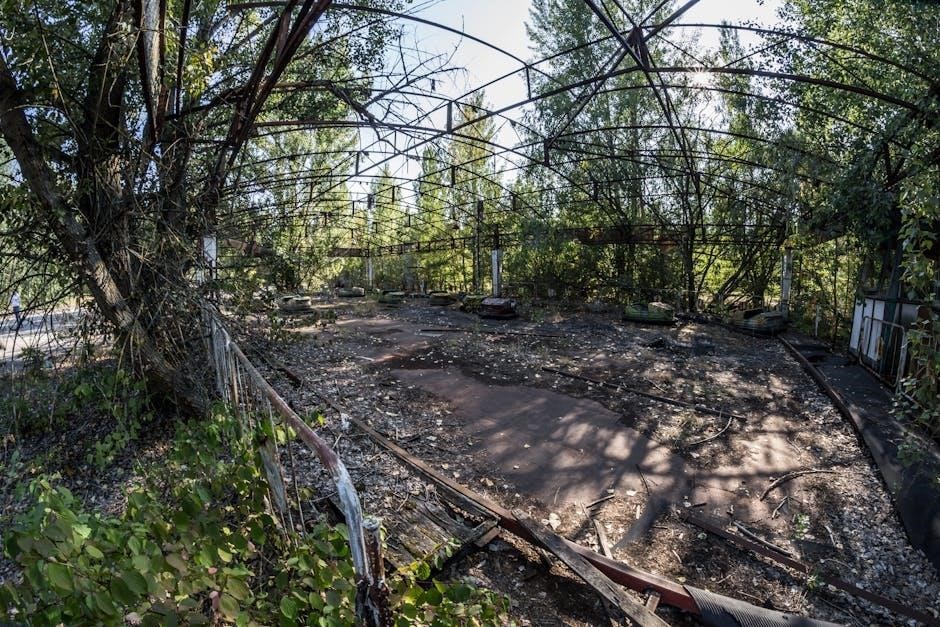voices of chernobyl pdf
“Voices from Chernobyl” by Svetlana Alexievich is a haunting collection of personal accounts from survivors of the 1986 nuclear disaster, offering a poignant glimpse into their struggles and emotions.
Overview of the Book and Its Significance
Voices from Chernobyl is a compelling oral history that captures the aftermath of the 1986 nuclear disaster through personal accounts of survivors, liquidators, and affected families. Svetlana Alexievich’s groundbreaking work provides a deeply human perspective on the tragedy, blending sorrow, resilience, and outrage. The book is significant for its unflinching portrayal of the disaster’s emotional and environmental impact, offering insights into the lives of those forever changed by the catastrophe. It has become a crucial historical document, shedding light on the Chernobyl legacy and its enduring consequences for Belarus and the world.
The book’s significance lies in its ability to transcend journalism, becoming a literary tribute to the victims and a warning about nuclear dangers. Its raw, emotional narratives have resonated globally, making it a vital read for understanding both the event and its human cost.
The Author: Svetlana Alexievich and Her Work
Svetlana Alexievich, a Belarusian journalist and writer, is renowned for her oral histories that capture the human experience of major historical events. Her work often focuses on the personal and emotional aspects of war, displacement, and disaster, offering a unique perspective on historical traumas. In Voices from Chernobyl, Alexievich employs her signature method of collecting and presenting raw, unfiltered testimonies, creating a powerful narrative that reflects the depth of suffering and resilience among those affected by the disaster. Her writing style blends journalism with literature, making her works both informative and deeply moving.
Alexievich’s commitment to documenting the voices of ordinary people has earned her international acclaim, including the Nobel Prize in Literature in 2015. Her ability to amplify the stories of those often overlooked has made her a leading voice in contemporary literature, ensuring that the memories of Chernobyl’s victims and survivors endure.

Background of the Chernobyl Disaster
The Chernobyl disaster occurred on April 26, 1986, at the Chernobyl Nuclear Power Plant in Ukraine, caused by a catastrophic explosion during a safety test, releasing radioactive materials into the environment.
The Events of April 26, 1986
On April 26, 1986, a safety test at the Chernobyl Nuclear Power Plant in Ukraine led to an uncontrollable power surge, causing a massive explosion. The blast destroyed the reactor building and released radioactive materials into the atmosphere. This event, the worst nuclear accident in history, contaminated vast areas of Belarus, Ukraine, and Russia. The immediate death toll included 28 individuals, while long-term health effects and environmental damage remained severe. The disaster highlighted critical safety failures and the consequences of inadequate nuclear regulation, as documented in Svetlana Alexievich’s “Voices from Chernobyl,” which captures the harrowing experiences of survivors.
The Impact on Belarus and Surrounding Regions
The Chernobyl disaster had a devastating impact on Belarus, with over 70% of the radioactive fallout contaminating its territory. Thousands of square kilometers were rendered uninhabitable, displacing hundreds of thousands of people. The surrounding regions in Ukraine and Russia also suffered severe contamination, leading to widespread health issues, including increased cancer rates and birth defects. The economic and social fabric of these areas was severely disrupted, with many communities forced to abandon their homes and livelihoods. Svetlana Alexievich’s “Voices from Chernobyl” poignantly captures the personal stories of those affected, illustrating the profound and lasting consequences of the tragedy.

Structure and Content of the Book
Voices from Chernobyl is structured as a collection of monologues and oral histories, presenting raw, emotional accounts from over 500 survivors, creating a vivid tapestry of experiences.
Personal Accounts and Oral Histories
Svetlana Alexievich’s Voices from Chernobyl captures the raw emotions and harrowing experiences of survivors through their personal accounts; These oral histories, collected from over 500 individuals, provide a deeply intimate and unfiltered perspective on the disaster. The narratives range from the immediate aftermath of the explosion to the long-term struggles of those affected, including evacuees, liquidators, and families of the deceased. Each story is a poignant reminder of the human cost of the tragedy, offering insights into the fear, loss, and resilience that defined their lives. This approach creates a powerful and emotional tapestry of survival and sorrow.
Themes of Survival, Sorrow, and Nuclear Tragedy
Voices from Chernobyl delves into the profound themes of survival and sorrow, illustrating the human condition in the face of catastrophic nuclear tragedy. The book explores how individuals coped with unimaginable loss, from the immediate shock of evacuation to the lingering health and psychological effects. Svetlana Alexievich’s narrative weaves together stories of resilience, grief, and the enduring impact of the disaster on communities. The interplay between personal and collective trauma underscores the broader implications of nuclear catastrophe, creating a poignant reflection on humanity’s fragility and the environmental consequences of technological failure. These themes resonate deeply, offering a powerful exploration of suffering and endurance.

Key Themes Explored in the Book
Voices from Chernobyl examines themes of fear, anger, and uncertainty, delving into the psychological and emotional toll of the disaster on survivors and their communities.
Fear, Anger, and Uncertainty Among Survivors
The survivors of Chernobyl experienced profound fear, anger, and uncertainty. Many faced the trauma of displacement, health crises, and the loss of loved ones, leaving lasting emotional scars. The immediate aftermath was marked by confusion and panic, as the true extent of the disaster was not fully disclosed. Survivors recounted feelings of helplessness as they struggled to comprehend the invisible threat of radiation. The lack of clear information from authorities exacerbated their anxiety, creating a sense of betrayal and mistrust. These emotions are vividly captured in their testimonies, providing a raw insight into the human cost of the tragedy.
The Role of Secrecy and Government Response
The Soviet government’s response to Chernobyl was marked by secrecy and misinformation, which worsened the crisis. Authorities initially downplayed the severity of the disaster, delaying critical evacuations and leaving many exposed to radiation. The lack of transparency fueled public distrust and exacerbated the suffering of survivors. Svetlana Alexievich’s work reveals how this secrecy denied people the truth about their situation, hindering their ability to protect themselves. The government’s priority to avoid panic led to further chaos, highlighting the devastating consequences of withholding information during a nuclear emergency. This section underscores how institutional silence compounded the tragedy’s impact on individuals and communities.

The Oral History Approach
Svetlana Alexievich’s oral history approach captures intimate, personal narratives from over 500 survivors, creating a powerful mosaic of experiences that reveal the human cost of the Chernobyl disaster.
Interviews with Over 500 Survivors
Svetlana Alexievich conducted interviews with over 500 survivors, including residents, liquidators, and families, to compile their harrowing experiences. These accounts reveal the personal struggles, fears, and resilience of those affected by the disaster. The interviews capture the raw emotions and vivid memories of individuals who witnessed the catastrophe firsthand. Alexievich’s approach emphasizes the human side of the tragedy, providing a deeply personal and emotional narrative. The voices of the survivors offer a comprehensive understanding of the disaster’s impact, from the immediate aftermath to its long-term consequences. This collection of stories serves as a powerful tribute to those who endured unimaginable hardship.
Interwoven Stories and Monologues
The book weaves together personal monologues and stories, creating a mosaic of experiences from the Chernobyl disaster. Each narrative is a unique perspective, blending individual tragedies with collective suffering. The interwoven accounts provide a rich tapestry of emotions, from fear and anger to hope and resilience. Alexievich’s masterful storytelling allows each voice to resonate distinctly, while contributing to a broader understanding of the catastrophe. This approach ensures that no single story overshadows the others, creating a powerful and moving portrayal of the event. The result is a deeply human and immersive account of one of history’s most devastating nuclear disasters.

Historical Context and Relevance
The Chernobyl disaster, occurring on April 26, 1986, remains the worst nuclear accident in history. “Voices from Chernobyl” provides a poignant reminder of its far-reaching consequences, ensuring historical relevance and a deeper understanding of the tragedy’s impact on individuals and society.
The Chernobyl Disaster’s Legacy
The Chernobyl disaster left an indelible mark on history, shaping global perceptions of nuclear safety and environmental risks. Its legacy extends beyond the immediate aftermath, influencing policy changes and international collaborations aimed at preventing similar tragedies. The disaster also spurred advancements in nuclear regulation and emergency response systems. Today, Chernobyl stands as a stark reminder of the potential consequences of human error and technological failure; The region surrounding the reactor remains largely uninhabitable, with ongoing efforts to contain and manage the site’s nuclear remnants. This legacy continues to resonate, underscoring the need for vigilance and responsibility in managing nuclear power.
Environmental and Health Consequences
The Chernobyl disaster released radioactive particles across vast areas, contaminating millions of square kilometers. The fallout, including iodine-131 and cesium-137, caused severe environmental damage and long-term health issues. Exposure led to a spike in thyroid cancer, particularly among children, and increased rates of other cancers and birth defects. The nearby forests and water sources became radioactive, affecting local ecosystems. The Exclusion Zone remains uninhabitable for humans due to high radiation levels. Survivors and cleanup workers, known as “liquidators,” suffered from chronic illnesses and psychological trauma. The disaster’s health consequences continue to impact generations, highlighting the devastating effects of nuclear accidents on both people and the planet. The environmental scars remain a stark reminder of the tragedy’s enduring impact.

Reception and Awards
“Voices from Chernobyl” received widespread acclaim, winning the National Book Critics Circle Award and contributing to Alexievich’s Nobel Prize in Literature in 2015.
2005 English Translation and Critical Acclaim
The 2005 English translation of Voices from Chernobyl, published by Dalkey Archive Press, marked a pivotal moment in the book’s global recognition. Translated by Antonina W. Bouis, the text resonated deeply with international readers, offering a harrowing yet intimate account of the disaster. Critics praised Alexievich’s oral history approach, which humanized the tragedy through survivors’ voices. The translation earned widespread critical acclaim, with major publications like The New York Times and The Guardian highlighting its emotional depth and historical significance. This edition played a crucial role in raising awareness about Chernobyl’s long-lasting impact and solidified Alexievich’s reputation as a masterful storyteller.
National Book Critics Circle Award and Nobel Prize Recognition
Svetlana Alexievich’s work gained monumental recognition with the National Book Critics Circle Award for Voices from Chernobyl in 2005. Her innovative oral history approach was lauded, and the book’s emotional depth resonated globally. This acclaim culminated in her being awarded the Nobel Prize in Literature in 2015, with the Swedish Academy praising her for creating “a monument to suffering and courage in our time.” The Nobel recognition highlighted her ability to weave personal narratives into a broader historical tapestry, cementing her legacy as a literary giant and ensuring her work’s enduring impact on global literature and public consciousness.

Availability and Formats
Voices from Chernobyl is available as a PDF and eBook. Free download links are accessible online, making the book widely reachable to readers globally.
Voices from Chernobyl PDF and eBook Options
The book is widely available in PDF and eBook formats, ensuring accessibility for readers worldwide. The PDF version can be downloaded for free from various online platforms, including Dropbox links, while the eBook is compatible with e-readers and apps. This digital accessibility has made it easier for global audiences to engage with the compelling narratives of Chernobyl’s survivors. Additionally, translations, such as the Chinese version released in 2015, further expand its reach. These formats preserve the original oral histories, making the stories of survival and sorrow readily available to readers interested in understanding the nuclear tragedy’s impact.
Free Download Links and Accessibility
Voices from Chernobyl PDF is readily available for free download through various online platforms, including Dropbox links and eBook repositories. This accessibility ensures that readers worldwide can access the powerful narratives of Chernobyl’s survivors without cost. The PDF format is particularly popular due to its ease of use and compatibility with multiple devices. Additionally, the book’s digital availability has facilitated its translation into several languages, further broadening its reach. This free accessibility has played a crucial role in spreading awareness about the Chernobyl disaster and its lasting impact on communities affected by the tragedy.

Cultural and Literary Significance
Voices from Chernobyl holds profound cultural and literary significance as it humanizes the nuclear tragedy through personal narratives, evoking empathy and reflecting on societal and environmental vulnerabilities globally.
Comparisons to Other Works by Svetlana Alexievich

Svetlana Alexievich’s Voices from Chernobyl mirrors her earlier works like Wars Unwomanly Face and Zinky Boys, which also explore human suffering through oral histories. While Voices from Chernobyl delves into the nuclear disaster’s aftermath, her other works examine war’s impact, showcasing her signature style of blending personal narratives with broader societal themes. This approach highlights her ability to transcend individual stories, creating a collective voice that resonates universally. Alexievich’s work consistently emphasizes the emotional and psychological toll of catastrophic events, drawing parallels between the human cost of war and environmental disasters. Her unique narrative technique solidifies her reputation as a master of documenting collective memory and trauma.
Impact on Public Perception of Nuclear Disasters
Voices from Chernobyl has profoundly shaped public perception of nuclear disasters, revealing the human cost behind the statistics. By sharing survivors’ accounts, the book demystifies the technical aspects of the catastrophe, making it relatable and emotionally charged. It challenges the notion of nuclear safety and highlights long-term environmental and health consequences. The book’s vivid narratives have sparked global discussions, influencing public opinion and policy debates. Alexievich’s work underscores the ethical responsibilities tied to nuclear energy, fostering a deeper understanding of the risks and vulnerabilities associated with such disasters. This shift in perception has made Voices from Chernobyl a crucial resource for raising awareness about nuclear safety and advocacy.
